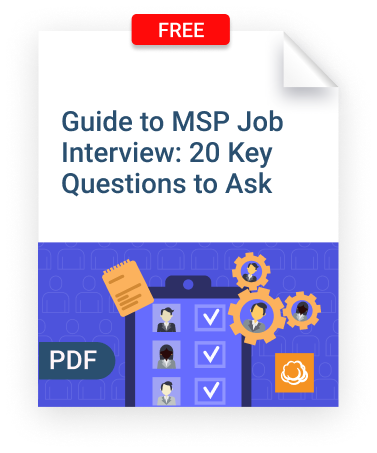Building a successful MSP business isn’t all about investing in IT infrastructure and streamlining service delivery. That’s just one part of the whole shebang.
You see, to even secure clients in the first place, you’ll need a solid sales and marketing framework. Marketing creates awareness about your products and generates leads, while the accompanying sales process proceeds to convert the leads into long-term customers.
Sadly, however, many MSP organizations struggle with this, because sales and marketing is a different ballgame from IT services. Fortunately for you, though, we’ve got your back. This article introduces you to the basics of MSP sales and marketing by answering all the burning questions that you might have on the subject.
What Is MSP Sales?
Sales for managed service providers is a holistic process in which resources, tools, and individuals collectively work together to engage leads, and then systematically convert them into customers.
This requires proper sales planning, a solid sales strategy, a highly motivated sales team, and consistent tracking of the sales KPIs (key performance indicators.)
What Is an MSP Sales Plan?
An MSP sales plan is a documented set of directives that act as a guideline for the entire sales process. It should define your sales plan, as well as describe the type of customers you’re targeting, plus the resources you need in order to channel leads from the top to the bottom of the sales funnel.
And to be specific:
- Building a sales funnel entails: defining the customer journey based on the various stages your customers go through before and after conversion; determining the amount of effort, resources, and time required to channel them from one stage to another; plus deciding how to engage with them along the conversion journey.
- Understanding your audience is all about getting to know the precise demographic you’re targeting in your campaign, as well as the corresponding customer pain points.
- Defining your resources means establishing a system for measuring and tracking your campaign success, plus allocating tools and team members to each sales funnel stage.
Further reading MSP Sales: The Comprehensive Guide
How to Get Sales for a New MSP
There are many channels you could use to generate leads and then convert them into customers. For instance, quite a number of MSP businesses rely on cold-calling, while others prefer paid advertising, social media marketing, and networking.
Whichever option you choose, ensure that you know your prospects, plus their corresponding IT problems and needs. Take time to do research into their business, develop a solid sales pitch, and then set up a meeting to explain how they stand to benefit from your IT solutions.
In doing that, don’t make the mistake of promoting your services aggressively. Instead, try to demonstrate the value that you offer. Then, finally, be keen enough to answer all your prospects’ questions, as well as follow up with them after the meeting.
Further reading How to Make New Customers from Your Prospects
Cold-Calling for MSP Sales: How to Do It Right
While cold-calling is a rather challenging approach to MSP lead generation, it can be highly rewarding if you apply some finesse. Just remember to:
- Conduct your research: Find out as much as you can about your prospects’ businesses by studying their websites, social media accounts, etc.
- Use a basic call script: Go straight to the point and introduce yourself, before proceeding to state some facts about their business based on your analysis. If they’re willing to listen, you should then explain what you offer and how it perfectly resolves their pain points.
- Accept rejections: Don’t be afraid to face rejections from uninterested parties. That’s part of the whole sales experience.
- Conduct follow-ups: It’s always a good idea to follow up with your prospects after the main presentation. But, while you’re doing that, ensure that you don’t come off as pushy and overly aggressive.
For more tips, you can go to our MSP cold calling guide.
What Are MSP Sales KPIs?
MSP sales KPIs - or key performance indicators - are the most critical metrics that you need to track throughout your sales process. In the end, they’ll help you measure the overall effectiveness of your campaign strategy and efforts.
For instance, one particular KPI that you might want to track is monthly recurring revenue - or MRR, for short. You’ll notice that it all depends on your close ratio, average MRR per client, FTA, and minimum MRR per client.
Other KPIs that are commonly tracked by MSPs include: value proposition, time to close, and average deal size.

![]()
How to Manage MSP Sales Objections
Sales objections can be discouraging. But, instead of giving up easily, try to turn them into conversion opportunities. Simply pay attention to what the prospect says, and then build a counter-pitch around their objection reasons.
For example, if they tell you that they have an in-house IT department, you can ask what they’d like to improve, or if they’re fully satisfied with their internal systems - before ultimately offering your assistance.
Further reading How to Deal with MSP Sales Objections
How to Sell Managed Services to SMBs
If you intend to sell managed services to small and medium-sized businesses, you should proceed as follows:
- Find out precisely what such customers expect from you.
- Center your messages on the customers’ pain points and needs, instead of how excellent you are.
- Focus on the value of your services, not the technology.
- Instead of offering discounts, get customers to understand the real value they stand to get for the standard price.
- Maintain simplicity and transparency to ensure that everyone understands your offering.
- Demonstrate your expertise in the services and be ready to back it up with testimonials or reviews.
For additional insights, check out our guide on how to sell managed services to SMBs.
How to Hire Sales Reps for Managed Service Providers
For the best sales results, you might want to form a diverse sales team of specialized reps with different sales skills. That way, they get to complement each other in the sales cycle.
The best time to bring in such a team would be, of course, after you’ve hired tech operators. You can start by advertising the positions with detailed job descriptions. Then, once the applications start streaming in, you could go ahead and set up a thorough interview and trial process, before finally signing employment contracts with the most qualified candidates.
Further reading MSP Sales Team Management Guide

What Is MSP Marketing?
For managed service providers, marketing is the whole process of promoting their business and services by creating awareness among prospective clients. In this way, they manage to attract leads, who are subsequently channeled to the conversion funnel.
Further reading MSP Marketing: How to Start So It Works
How to Market an MSP Business
To properly market your MSP business, you should start with:
- Defining your target audience.
- Creating valuable content in line with your customers’ needs.
- Setting up a website that offers all the details that your customers might need.
- Forming alliances with businesses and brands that offer marketing opportunities.
Then, when it comes to launching marketing campaigns, you should consider prioritizing digital marketing methods like social media marketing, search engine marketing, SEO, paid ads, email marketing, and content marketing. You could also capitalize on traditional methods like billboards and magazine ads, especially if they connect well with your target audience.
Further reading Marketing Strategies for Growing MSPs
What Are the MSP Marketing and Sales Tools?
While there’s a wide range of effective tools that managed service providers could adopt in their marketing and sales campaigns, there are some that have proven to be quite exceptional over the years.
In the marketing department, for instance, you might not want to miss out on Google Analytics, Google Search Console, Ahrefs, Semrush, Hootsuite, Mailchimp, and the likes. You can check out the best free options for MSPs from this article.
Then, when it comes to sales, you could have your sales teams gather contacts for cold-calling from local business directories, the Global Database platform, as well as professional networking sites like LinkedIn. Speaking of which, here’s an article that covers all the high-quality prospect sources for MSP cold-calling.
Conclusion
Based on these pointers, it’s evident that MSP sales and marketing isn’t just a matter of posting ads and waiting for clients to stream in. The most successful MSP businesses have skilled marketers and salespeople backing them up, and they continue to leverage a wide array of tools, channels, and strategies.
If you’d like to learn the tricks, we’ve included all the details in our sales and marketing guides. So, go ahead and check them out today.







